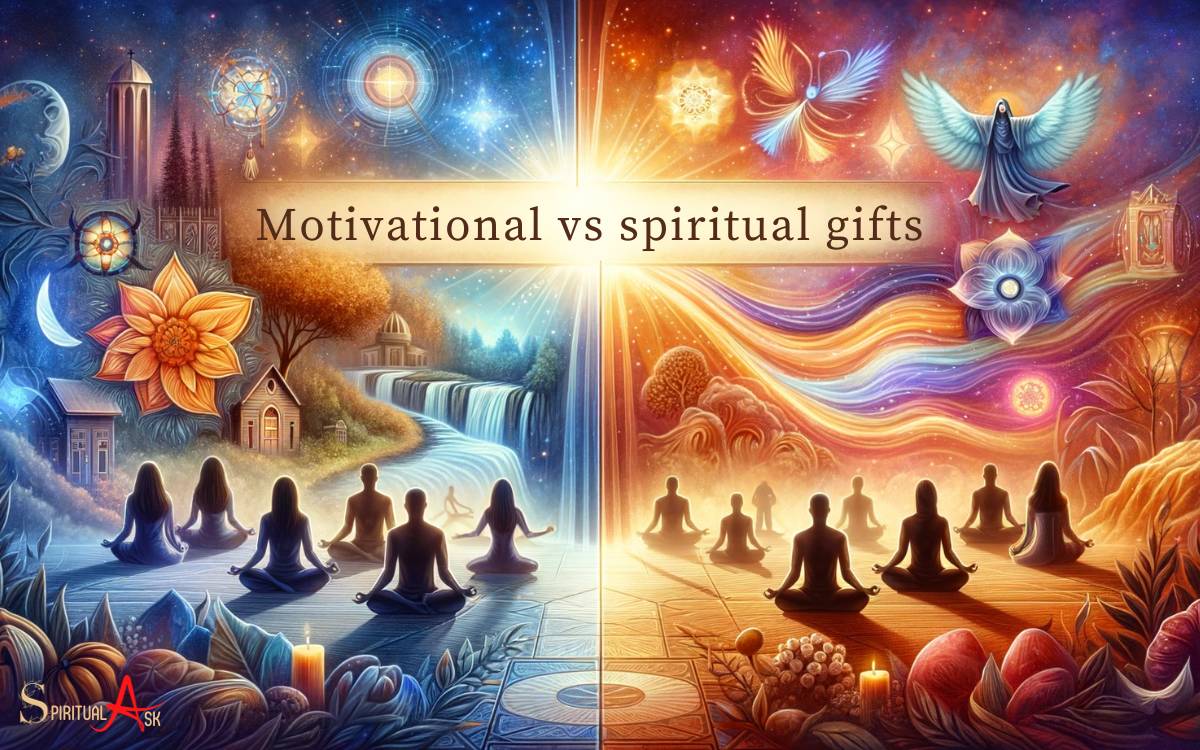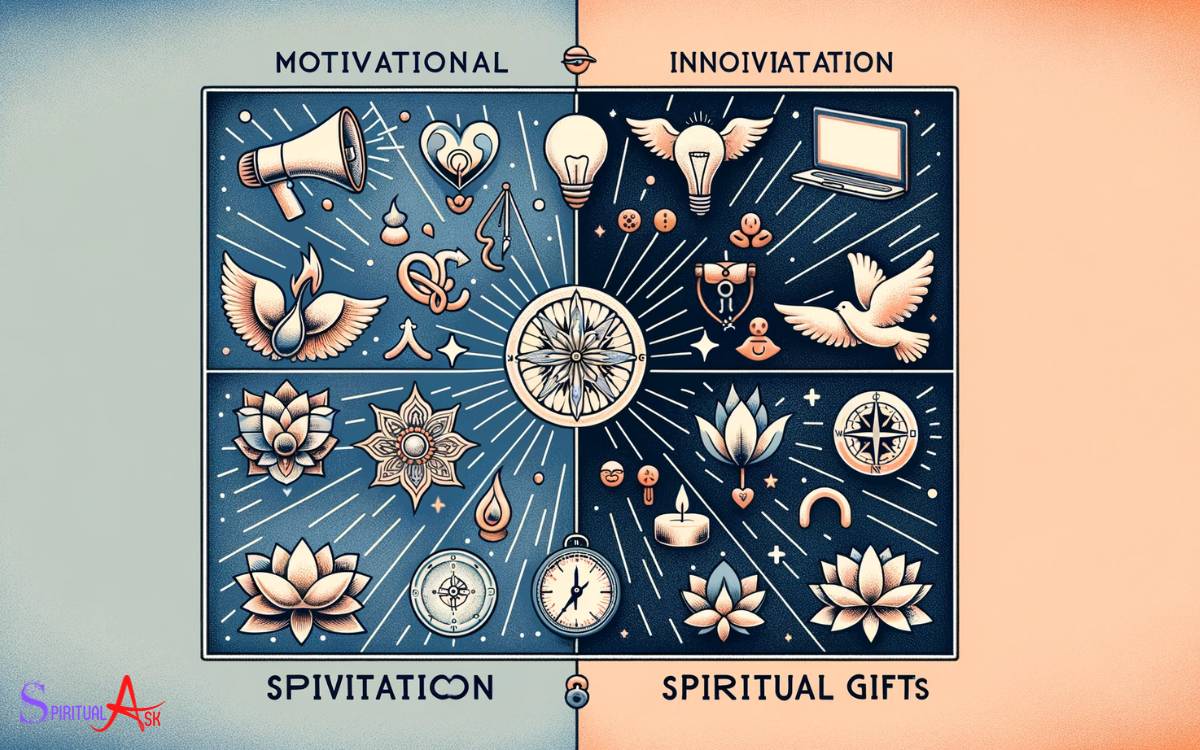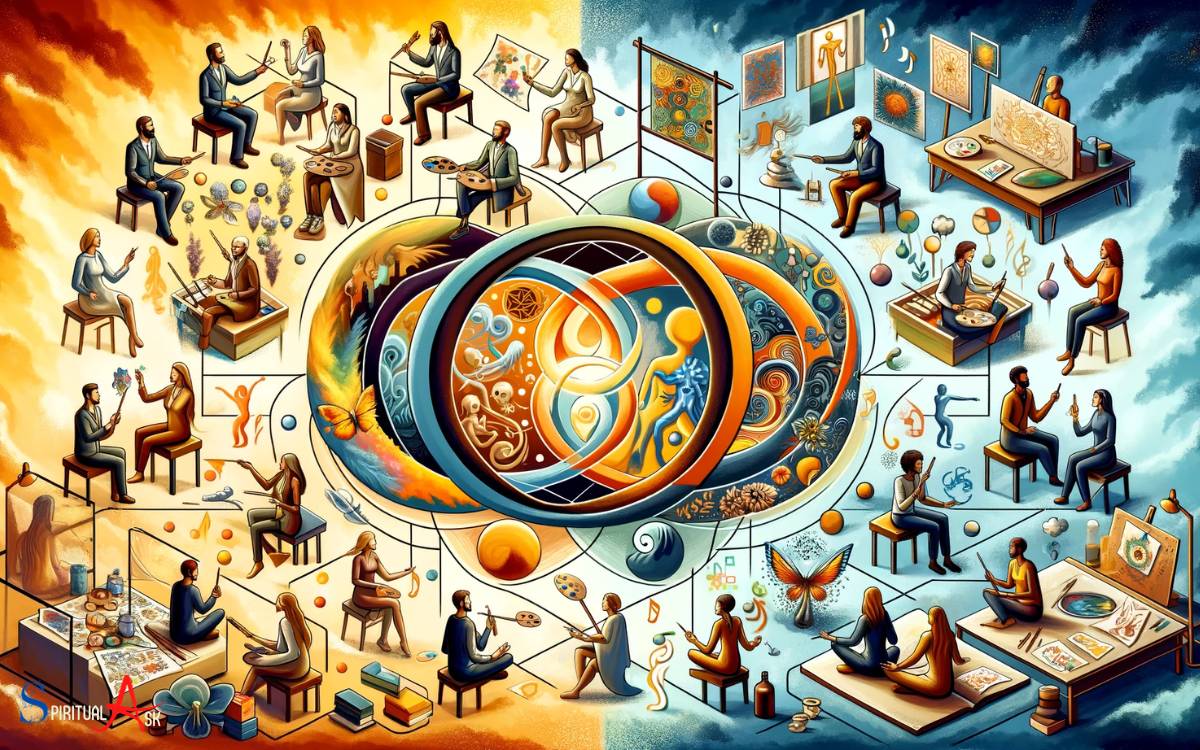Motivational Gifts Vs Spiritual Gifts: Comparison Guide!
Motivational gifts, also known as motivational skills, are natural talents or abilities that drive individuals to act in certain ways. These can include leadership, teaching, encouragement and generosity among others.
On the other hand, spiritual gifts are special abilities bestowed upon individuals by the Holy Spirit for the edification of the church community according to Christian belief. These may encompass prophecy, healing, speaking in tongues and interpretation of tongues.
Both motivational and spiritual giftings play important roles within a person’s life journey but they function differently.
While motivational skills largely influence our pursuits in life including career paths and personal interests; spiritual gifting guides our service within faith contexts facilitating unity and growth of religious communities.
It’s critical though not uncommon for one’s motivational gift such as leadership skill to align with his/her spiritual gift like pastoring leading a congregation spiritually underlining how these two types of gifting can intersect harmoniously enriching both secular life aspects as well as faith-based practices.

Key Takeaway
7 Aspects: Motivational Gifts Vs. Spiritual Gifts
| Aspect | Motivational Gifts | Spiritual Gifts |
|---|---|---|
| Definition | Personal attributes or talents that drive and motivate an individual in their daily life and endeavors. | Special abilities or talents given by the Holy Spirit to individuals for the purpose of serving and building up the Christian community. |
| Source | Often associated with an individual’s personality, experiences, and natural inclinations. | Believed to be imparted by the Holy Spirit as described in the New Testament, primarily in the books of Romans, 1 Corinthians, and Ephesians. |
| Application | Used for personal and secular pursuits, such as career success, personal development, and achieving life goals. | Primarily utilized within a Christian context for the edification and growth of the Church, including roles like teaching, prophecy, and healing. |
| Variability | Can vary greatly among individuals, and everyone may possess a unique combination of motivational gifts. | Spiritual gifts are believed to be distributed by the Holy Spirit according to His will, and individuals may have one or more specific gifts. |
| Purpose | Serve personal goals and ambitions, as well as contribute to success and fulfillment in various life areas. | Serve the greater good of the Christian community, promote spiritual growth, and strengthen the body of Christ. |
| Examples (Motivational) | Leadership, teaching, administration, creativity, compassion, encouragement, discernment, etc. | Prophecy, healing, speaking in tongues, interpretation of tongues, wisdom, knowledge, faith, etc. |
| Biblical Basis (Spiritual) | Found primarily in Romans 12:6-8, which discusses various motivational gifts within the Christian context. | Described in passages like 1 Corinthians 12, Ephesians 4:11-12, and Romans 12, emphasizing the diversity and purpose of spiritual gifts in the Church. |
Key Differences Between Motivational Gifts And Spiritual Gifts
Understanding the differences between motivational gifts and spiritual gifts is essential for individuals seeking to deepen their understanding of their own unique talents and abilities.

While both types of gifts contribute to personal growth and service, they are distinct in their nature and purpose.
This article will discuss the fundamental distinctions between the two types of gifts, explore the nature and purpose of motivational gifts, highlight the spiritual aspect of spiritual gifts, and mention how these gifts are perceived in different contexts.
The Fundamental Distinctions Between The Two Types Of Gifts
Motivational gifts and spiritual gifts may seem similar at first glance, but they differ in their origin, focus, and intended use.

Firstly, motivational gifts stem from a person’s natural abilities, personality traits, and temperament. These gifts are often present from birth and are shaped and developed through life experiences and personal growth.
Motivational gifts are typically more focused on human interaction and can encompass a wide range of talents such as leadership, teaching, or encouraging.
On the other hand, spiritual gifts are bestowed by a higher power, often referred to as the Holy Spirit, and are specifically granted for the benefit of others and the growth of the spiritual community.
Spiritual gifts are not based on personal characteristics or skills but are empowered by divine guidance and purpose. These gifts can include abilities such as healing, prophesy, or speaking in tongues. These unique abilities are often seen as tools for service within a community, helping to build up and strengthen the faith of others. An overview of spiritual gifts explained reveals how each gift is meant to contribute to the greater good, complementing one another in a harmonious way. Ultimately, embracing these gifts encourages individuals to act selflessly and faithfully, fostering a deeper connection with both their own spirituality and the collective spirit of the community.
It is important to note that while both types of gifts have distinct origins, they can work harmoniously together, complementing and enhancing one another in individuals who possess both motivational and spiritual gifts.
Explore The Nature And Purpose Of Motivational Gifts

Motivational gifts are inherently personal and focus on individual talents and abilities that drive a person’s passions and motivations.
These gifts are often related to specific personality traits and natural inclinations, and they are intended to be used primarily for personal growth and the betterment of society.
The purpose of motivational gifts is to fulfill one’s potential and to contribute to the well-being of others. Individuals with motivational gifts often find fulfillment by utilizing their talents and putting them to use in various roles such as leaders, teachers, counselors, or motivators.
These gifts empower individuals to positively impact their surroundings and facilitate personal growth in themselves and those around them.
Highlight The Spiritual Aspect Of Spiritual Gifts
Spiritual gifts, in contrast to motivational gifts, have a distinct spiritual aspect that sets them apart. These gifts are bestowed by a higher power and are associated with supernatural abilities and spiritual discernment.

The purpose of spiritual gifts is centered on fostering spiritual growth, serving the spiritual community, and carrying out divine purposes.
These gifts are meant to be used within the context of religious or spiritual practices, often within the framework of organized religion or faith-based communities.
Individuals with spiritual gifts are seen as conduits of divine power and guidance, channeling their abilities for the greater good of the spiritual community and as a means of connecting with the divine.
It is worth noting that not everyone believes in the existence or relevance of spiritual gifts. These gifts are predominantly recognized within religious or spiritual contexts, where they are acknowledged as manifestations of divine power and grace.
To sum up, understanding the key differences between motivational gifts and spiritual gifts is crucial for individuals seeking personal growth and deeper spiritual connection.
While motivational gifts stem from personal abilities and focus on personal growth and contribution to society, spiritual gifts are bestowed by a higher power and have a distinct spiritual aspect, serving the growth and purpose of the spiritual community. Both motivational gifts and spiritual gifts play vital roles in fostering a supportive and thriving community, but they operate on different levels of influence and intention. Encouragement as a spiritual gift can uplift individuals, offering them the strength to persevere through challenges and affirming their inherent value and potential. Ultimately, recognizing and cultivating both types of gifts can lead to a more harmonious integration of personal ambitions and collective spiritual growth.
Recognizing and embracing these gifts can lead to a fuller understanding of one’s unique value and potential in both personal and spiritual contexts.
How To Identify And Nurture One’s Motivational Gifts

Identifying and nurturing your motivational gifts can be a transformative process in unlocking your true potential.
Here are some steps to help you in this journey:
- Self-reflection: Take time to reflect upon your natural inclinations, preferences, and passions. What activities energize and fulfill you? What areas do you excel in? Identifying these areas of strength will provide clues to your motivational gifts.
- Feedback from others: Seek feedback from trusted friends, family members, or mentors who know you well. They may have noticed certain patterns or talents that are not immediately apparent to you.
- Experimentation: Explore different areas of interest and engage in activities that align with your passions. Through trial and error, you can gain a better understanding of what truly motivates and excites you.
- Evaluation: Reflect on your experiences and evaluate the impact you have on others. Do you find yourself naturally gravitating towards certain roles or responsibilities? Do you consistently receive positive feedback in specific areas?
- Education and growth: Once you have identified your motivational gifts, invest in further education and skill development in those areas. Seek out mentors or training programs that can help refine and enhance your abilities.
Nurturing your motivational gifts is a lifelong journey. Embrace opportunities for growth and continually seek ways to leverage your gifts to make a positive impact on the world.
Explore Various Types Of Spiritual Gifts
Within the realm of spiritual gifts, there are various types that individuals may possess. These gifts, while diverse in nature, all aim to bring about positive change and spiritual growth.

Let us explore some of these types:
Prophecy
Prophecy refers to the ability to receive messages, insights, or visions from a higher power and deliver them to others. Those with the gift of prophecy are often seen as messengers, conveying divine wisdom and guidance to individuals or communities. This gift can provide clarity, direction, and spiritual enlightenment.
Healing
The gift of healing involves the capacity to facilitate physical, emotional, or spiritual healing in others. Individuals with this gift may possess a heightened sensitivity towards the well-being of others, and through prayer, laying on of hands, or other spiritual practices, they may act as channels for divine healing energy.
Discernment
Discernment is the ability to perceive and understand spiritual insights and truths. Those with the gift of discernment possess a keen sense of intuition and wisdom, enabling them to differentiate between divine guidance and deceptive influences. This spiritual gift aids in making wise decisions and advising others on their spiritual path.
These are just a few examples of the many spiritual gifts that exist. Each gift plays a unique role in the spiritual and religious landscapes, serving the purpose of enlightening, healing, guiding, and uplifting individuals and communities.
Overlap And Interplay
When it comes to understanding and exploring our unique gifts and abilities, there is often an interplay between our motivational gifts and spiritual gifts. While these two types of gifts may appear distinct, they can actually overlap in fascinating ways.

Understanding how they intersect and influence each other can help individuals harness their full potential and deepen their spiritual growth.
Discuss Instances Where Motivational Gifts And Spiritual Gifts May Overlap
In some instances, there can be a clear overlap between motivational gifts and spiritual gifts. This occurs when our natural talents and inclinations align with the spiritual gifts bestowed upon us by the Holy Spirit.
For example:
- Leadership: A person with a motivational gift of leadership may also possess the spiritual gift of leadership, enabling them to effectively guide and inspire others in both secular and spiritual contexts.
- Encouragement: Those with the motivational gift of encouragement may find their spiritual gift of exhortation strengthens their ability to uplift and support others in their spiritual journey.
- Teaching: Someone with a motivational gift of teaching may also have the spiritual gift of teaching, allowing them to share their knowledge and insights in both educational and spiritual settings.
In these instances, individuals experience a powerful synergy between their motivational and spiritual gifts, allowing them to make a meaningful impact in various spheres of life.
Choosing The Right Gift
When it comes to finding our purpose in life and making a meaningful impact on the world, understanding our unique gifts is crucial.
These gifts, whether they fall under the category of motivational gifts or spiritual gifts, can provide us with a sense of direction, fulfillment, and purpose.

However, with so many choices available, it can be challenging to determine which gift aligns best with our goals and values.
In this section, we will provide guidance on how individuals can determine their dominant gift and offer tips for introspection and self-discovery to help you make the right choice.
Provide Guidance On How Individuals Can Determine Which Type Of Gift Aligns With Their Goals And Values
Recognizing which type of gift resonates with your goals and values requires some introspection and self-assessment.
Here are some practical steps to help you in this process:
- Reflect on your passions and interests: Consider the activities that bring you joy and fulfillment. What subjects or causes ignite a fire within you? These areas often align with your motivational or spiritual gifts.
- Examine your natural talents: Take stock of the skills and abilities that come effortlessly to you. What tasks or roles do others often seek your help with? These aptitudes can provide insights into your dominant gift.
- Consider your impact on others: Pay attention to the positive influence you have on people around you. What do others consistently appreciate or admire about you? This feedback can shed light on the type of gift that resonates with your interactions and relationships.
- Connect with your values: Identify your core values and beliefs. What principles guide your decisions and actions? Once you understand your values, you can assess which gift aligns with these guiding principles.
Offer Tips For Introspection And Self-discovery To Identify One’s Dominant Gift
Discovering your dominant gift requires deep introspection and self-awareness.
Use these tips to gain clarity:
- Journaling: Write down your thoughts, feelings, and experiences. Explore patterns, recurring themes, and moments of joy or fulfillment.
- Meditation and mindfulness: Practice meditation to quiet your mind and tap into your inner wisdom. Mindfulness helps you observe your thoughts and emotions without judgment, providing insights into your true self.
- Seek feedback: Ask trusted friends, family, and mentors for their insights on your gifts. Others may have a better perspective on your strengths and unique qualities.
- Take personality assessments: Utilize reputable personality tests, such as Myers-Briggs Type Indicator (MBTI) or StrengthsFinder, to gain insights into your natural tendencies and strengths.
- Explore different experiences: Engage in new activities, hobbies, or volunteer work. Exploring different avenues can help you identify what energizes and motivates you.
How Do Spiritual Gifts Compare to Motivational Gifts in Influencing Career Choices?
Spiritual gifts and motivational gifts both significantly influence career choices, though they operate from slightly different premises.
Spiritual gifts and career choices are intertwined, as these gifts are believed to be divinely given for the purpose of serving others and fulfilling one’s role in a community.
In contrast, motivational gifts are more about personal inclinations and passions that drive an individual’s behavior and decisions.
- Spiritual Gifts: Include wisdom, healing, prophecy, and teaching, guiding individuals towards careers that allow them to serve and uplift others in a spiritual or communal context.
- Motivational Gifts: Relate to personal motivations such as leadership, encouragement, giving, and mercy, often directing people towards professions where they can express these inclinations, like social work, business, or counseling.
While spiritual gifts and career choices are aligned with serving a higher purpose or the common good, motivational gifts are more focused on personal satisfaction and effectiveness in one’s work. Understanding both can provide a comprehensive insight into the most fulfilling career path for an individual.
Conclusion
Understanding the difference between motivational gifts and spiritual gifts is crucial for personal growth and spiritual development.
While motivational gifts focus on our natural abilities and talents, spiritual gifts are bestowed upon us by the Holy Spirit for the benefit of the church and others.
By recognizing and utilizing both types of gifts, we can fully embrace our unique purpose and contribute to the world around us in a meaningful and impactful way.






